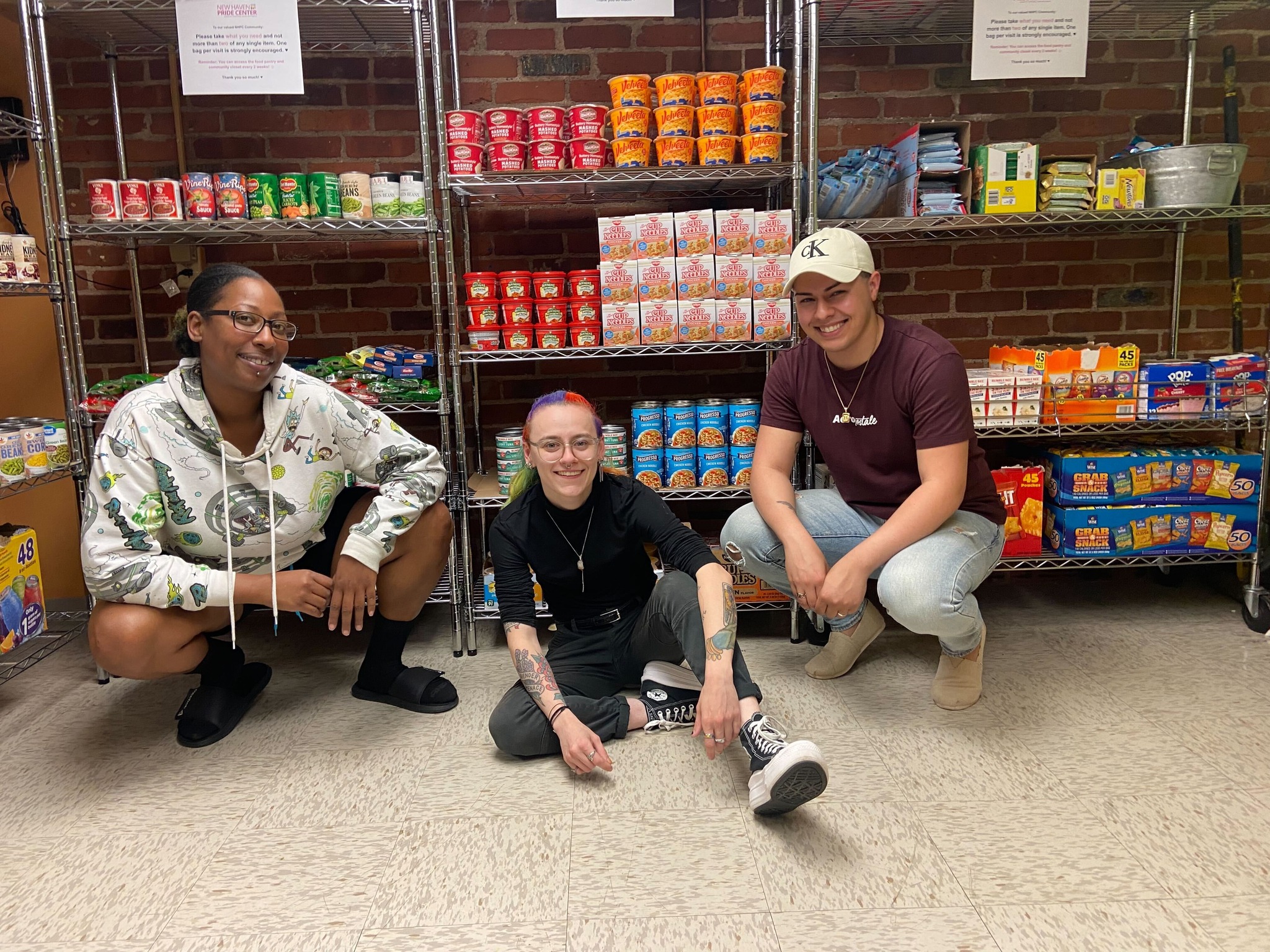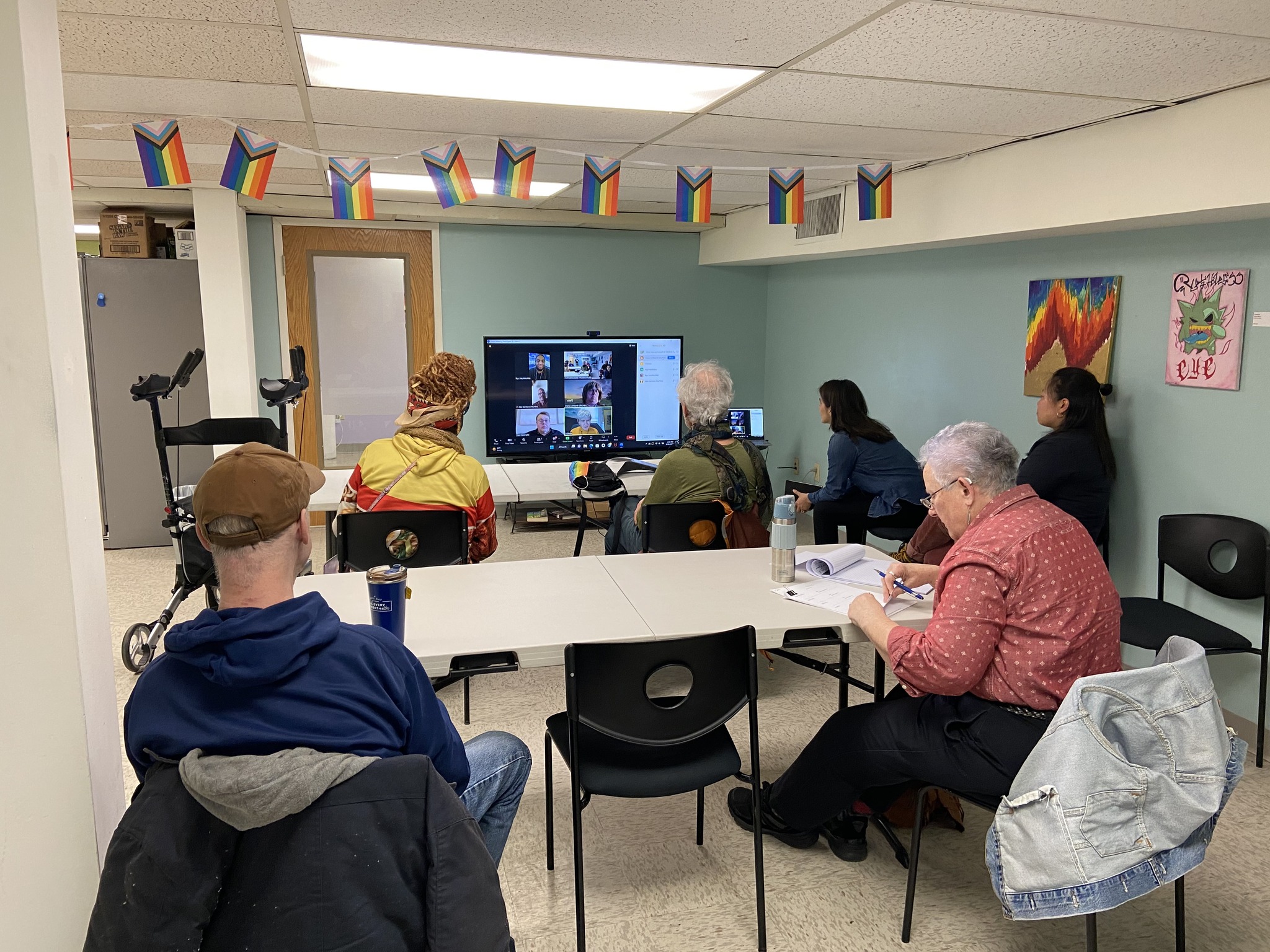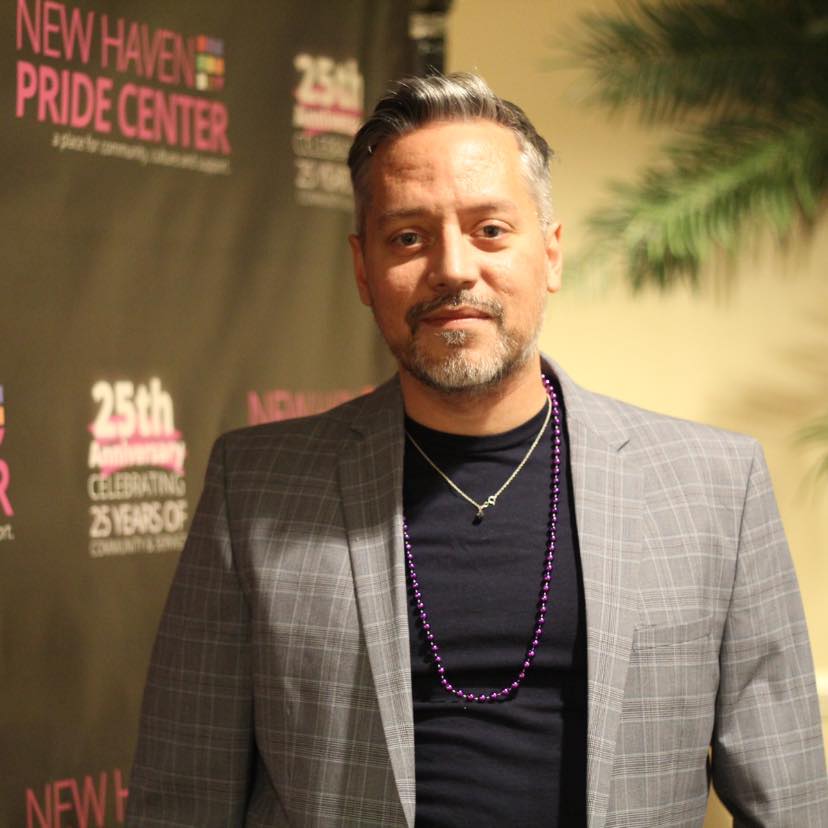By Jane Latus
Community: that’s what it was all about 27 years ago when activists formed the New Haven Pride Center. Founding Director John D. Allen, Ed.D. conducted a community needs assessment as part of his graduate work that validated his premise: there was a pressing need for a location in the city to meet, organize, and just be. From this, the New Haven Pride Center was born.
Since its first years on a shoestring budget with one staff member, the Pride Center steadily grew. In 2022, nearly 15,000 people participated in its programs, implemented by 12 paid staff, board members, and around 200 volunteers. Hundreds depend on the center for essentials. When its food pantry was unavailable during quarantine for 17 weeks, dozens of volunteers delivered food to 125 families. And then, something happened, which threatened the center’s existence—a financial crisis related to its essential tax-exempt status.
Last year, the board discovered an unopened second notice from the IRS, warning that the center’s 501(c)(3) tax-exempt status was in jeopardy due to failure to file tax returns for three consecutive years. The news came as a surprise to (all but one) of the staff and board members, who were unaware the IRS had sent an initial warning letter. “It came out of left field,” says board Co-President Nicholas Bussett.

The board immediately hired compliance consultant BryteBridge Nonprofit Solutions to work with the then-director to file the overdue returns and prevent loss of tax-exempt status. When a board member later contacted BryteBridge for a progress check, they learned that nothing had been done and that the firm had not received the required paperwork. The board removed the director and appointed Juancarlos Soto interim director. (Soto had joined the center as a case manager three years previously and was deputy director at the time.) The board subsequently received a letter from the IRS saying its 501(c)(3) status had been revoked.
The immediate result of loss of IRS status was loss of funding, and for one month, all staff but Soto were furloughed.
The Community Steps Up
Soto says that during the month he was the lone staff member, he wasn’t really alone. Volunteers rallied to support the center. Although programs were suspended, services were uninterrupted.
The next few weeks were “the roughest imaginable,” board member Dolores Dégagé Hopkins told community members at a February 2023 online Town Hall immediately after the tax-exempt status had been retroactively reinstated. Yet that wouldn’t have happened without the efforts of politicians and other organizations.
State Rep. Jeff Currey sped up the process of securing $200,000 in state aid (previously designated to the center from the American Recovery Act). Sen. Richard Blumenthal worked with the IRS to accelerate the turnaround time for the process of reinstatement.
Other LGBTQ+ organizations came to the center’s aid as well. The Triangle Community Center helped keep the food pantry going. New Haven businesses, nonprofits, professionals, and individuals donated money, held food drives, and volunteered. Accounting firm Marcum, LLP donated its financial services.
Co-President Hope Chávez told attendees of the Town Hall meeting that the board was determined to fully resume operations and implement checks and balances as part of the rebuilding plan. “We recognize rebuilding trust with the community, staff, and folks in general will be a journey,” she said. “We are aware there were some blinders on. There was an extent to which we possibly took trust too far.”
Coming Back Stronger
No question, this was a traumatic experience for the organization, and it prompted extensive self-examination and subsequent administrative and policy overhauls. “The transition has been painful on a personal level and a professional level,” says Soto. He felt burdened with “the fear of closing if I don’t turn this ship around.”
However, the crisis was also a good time to correct course, he says. He says that over the years, the center drifted away from its original focus on community service and became more of an arts center.
“We’re now moving in the direction we want to be moving, returning to our roots, which is being a community center. New Haven has a plethora of arts organizations, but has only one LGBTQ+ community center ,” he says.
Months later, Soto is clearly relieved to have programming back because the community badly needs a home. “The number-one thing I hear from people is, ‘I feel lonely,’ and ‘I feel afraid,’” he says.
Being a community center means providing a safe space for hanging out, support groups, educational programming, organizing, etc. The main priority, however, is meeting the basic needs of the people it serves.
“Our priorities are that the food pantry is always full, the Community Closet always has clean clothes, and hygiene products are always stocked,” says Soto. The center serves approximately 50 people a week with basic needs like these.
Anyone is welcome to drop in to warm up or cool down, use a computer for fun or to apply for a job or benefits, microwave a lunch from the food pantry, use the library, or watch Netflix.
For camaraderie and support, the center offers several “affinity spaces,” support and social groups for those sharing interests or identities. It is a safe place for teens, who have been ousted from their families, and young adults struggling financially.
They are among the many who rely on the New Haven Pride Center for everything from survival to companionship. “I didn’t realize how many members of the LGBTQ+ community were in need in Greater New Haven until I joined the board,” says Bussett.

Reemergence and Moving Forward
“We’re living through really fucked up times. We’re living in Connecticut and we’re experiencing homophobia and transphobia here,” says Soto. And more trans and gender nonconforming people are coming here, fleeing the legislative equivalent of hate crimes in red states. Connecticut needs to step up for them, too, he adds.
If you want to keep up with the ever-changing action at the center, don’t blink. Or at least check their social media regularly. There is a monthly clothes swap where you can bring some and/or take some. There are one-time craft events, and testimony-writing nights. Needs dictate programs like this summer’s sock and underwear drive.
The center conducts teach-ins on such topics as making your business welcoming, how to be an ally, the use and administration of Narcan in drug overdoses, and more.
Whoever you are, you’ll likely find the center has an affinity space that suits you, or you can suggest a new one. All are hybrid—online and in-person. They include support groups for gender, orientation, and culture, plus there’s an intergenerational Rainbow Friends and Elders, for example. Other groups, like Narcotics Anonymous, meet at the center, providing a safe place for queer people to attend.
Then there are youth services, with intensive programs for artists and writers, game nights, Black and Brown Queer Camp, and the “Real Talk” series on such serious issues as mental health.
The center also organizes some big annual events. It hosts PRIDE New Haven every September. After the youth-focused nonprofit True Colors closed in 2021, the center took over organizing the annual Connecticut LGBTQ+ Youth Conference. It’s the largest such teen conference in the country.
The center had to forego its major fundraiser, the Dorothy Award. The loss “was definitely felt by the community,” says Bussett, who says it will return.
But the daily, ordinary gatherings at the center give Soto the reward that for nonprofit workers doesn’t come in the form of a big paycheck. One day a woman came in to pick up her son, who was attending a youth program. She saw Soto, and they recognized each other as former co-workers at another organization. “She started to cry. I asked her, ‘What’s going on?’” She explained hers were tears of relief. Seeing Soto, she foresaw a successful future for her son. She told him, “I’m so happy now because I have a different idea of what my son can grow up to be.”
Bussett has a similar story, about someone who came in looking for help finding a job and is now thriving. “That’s why I stick around,” he says. So is the Pride Center; “we’re not going anywhere.”
Looking back, life for queer people in 1996 Connecticut when all this started seems eons ago and dimensions away. Life did get better for LGBTQ+ people in the state since then. There is still work to do, however. In many respects, today is for many a scary time to be queer, and support for marginalized communities is as important as ever.









More Stories
Schedule of Events: Pride Month and Beyond, 2025
Connecticut Sun: Playing for Good
Call Him Mister Connecticut: Jean Carlo Salazar’s Journey as Nurse, Model and Pageant Contestant